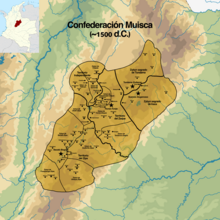Indigenous people of Colombia and Venezuela
You can help expand this article with text translated from the corresponding article in Spanish. Click for important translation instructions.
|
| Regions with significant populations | |
|---|---|
| Colombia, Venezuela | |
| Languages | |
| Achagua | |
| Religion | |
| Traditional religion | |
| Related ethnic groups | |
| Guahibo, U'wa, and Other Arawakan-speaking peoples Especially Baniwa, Tariana, and Tegua |
The Achagua (also Achawa and Axagua) are an indigenous people of Colombia and Venezuela. At the time of the Spanish colonization of the Americas, their territory covered the present-day Venezuelan states of Bolívar, Guárico and Barinas. In the late twentieth century there were several hundred Achaguas remaining.
Municipalities belonging to Achagua territories
| Name | Department | Altitude (m) urban centre |
Map |
|---|---|---|---|
| Támara (shared with U'wa) |
Casanare | 1156 |  |
| Nunchía (shared with U'wa) |
Casanare | 398 |  |
| Yopal | Casanare | 390 |  |
| Aguazul (shared with Tegua) |
Casanare | 290 |  |
| Tauramena | Casanare | 460 |  |
| Recetor (shared with Tegua) |
Casanare | 800 |  |
| Chámeza (shared with Tegua) |
Casanare | 1150 |  |
| Paya | Boyacá | 970 |  |
| Labranzagrande (shared with U'wa & Guahibo) |
Boyacá | 1210 |  |
Culture
Achagua people live in large villages. Clans live together in communal houses. Polygamy is commonplace. They farm crops, such as bitter cassava. They traditionally poison their arrows with curare.
There is a small town in Apure called Achaguas.
Language
Achagua people speak the Achagua language, a Maipurean Arawakan language.
See also
References
- ^ "Achagua." Encyclopædia Britannica. (retrieved 1 December 2011)
- ^ James Stuart Olson (1991), The Indians of Central and South America: An Ethnohistorical Dictionary, Greenwood Publishing Group. p2
External links
- Achagua artwork, National Museum of the American Indian Archived 9 August 2016 at the Wayback Machine
| Venezuelan people | |
|---|---|
| Indigenous | |
| Africa | |
| Americas | |
| Asia | |
| Europe | |
| Others | |
| Related topics | |
| Muisca | ||||||||||||||||||||||||||||
|---|---|---|---|---|---|---|---|---|---|---|---|---|---|---|---|---|---|---|---|---|---|---|---|---|---|---|---|---|
| ||||||||||||||||||||||||||||
| ||||||||||||||||||||||||||||
| ||||||||||||||||||||||||||||
| ||||||||||||||||||||||||||||
| ||||||||||||||||||||||||||||
| ||||||||||||||||||||||||||||
